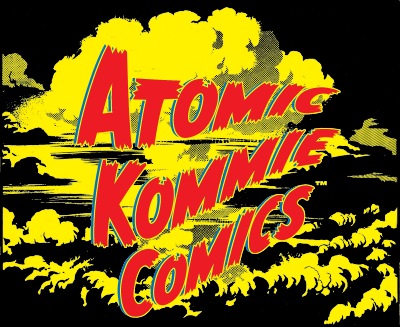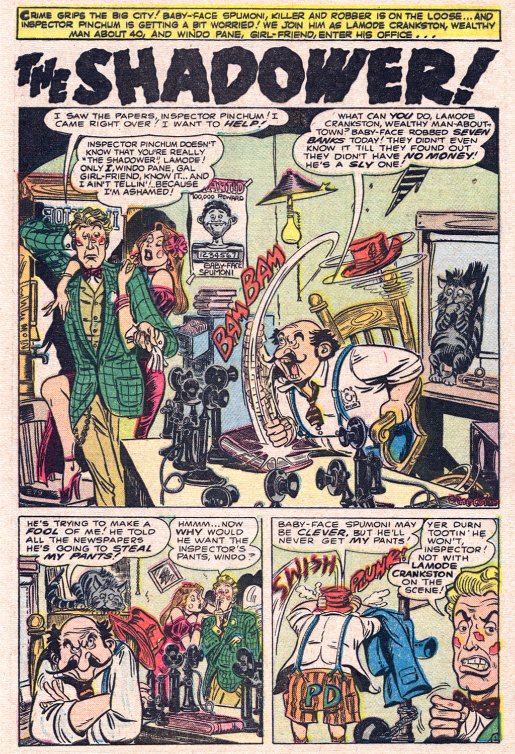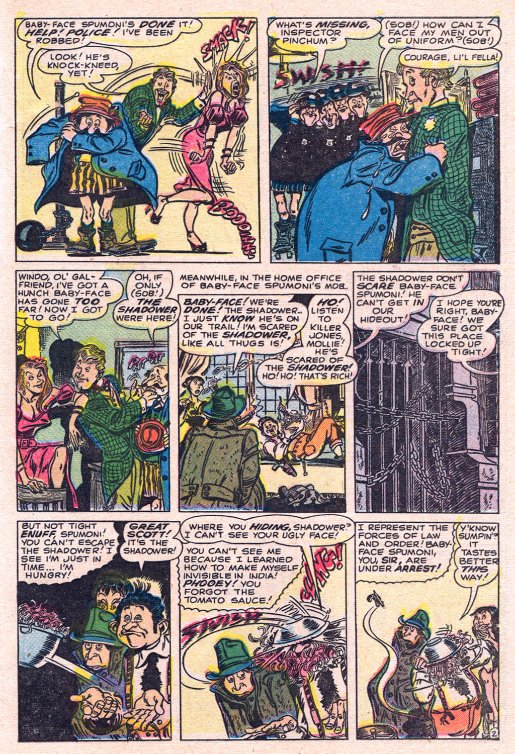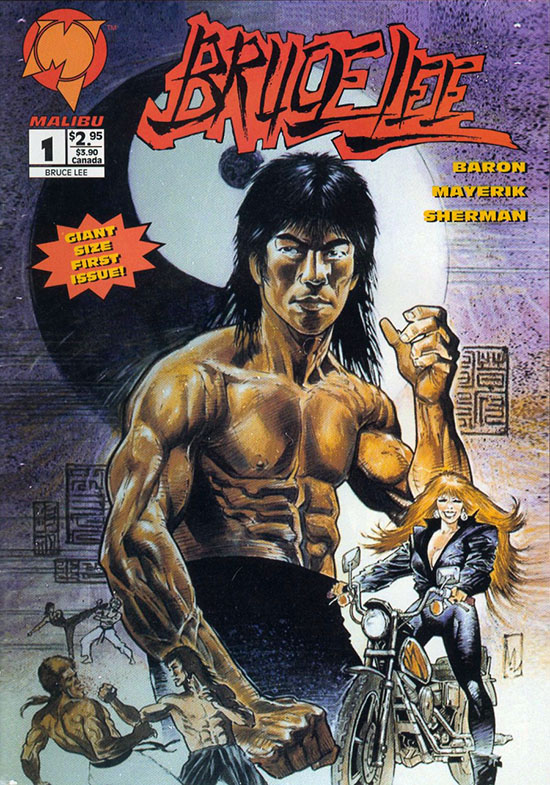2You can read the previous chapter HERE! Cranston walked quietly to his chair and sat down. In the thick silence his hooded eyes continued to study the men in the room. He ran them down in his mind. First the giant man in the uniform of a Major General. Cranston knew him well: Major General George Broyard, commandant of the NASA Utah Base for Special Project Full Moon. The General was a famed soldier, a well-known man of science, and a capable administrator.The tall civilian to the right of General Broyard was known to Cranston by sight: Doctor J. P. Cassill, Senior NASA Scientist at the Utah Base. Cassill was a nervous man, quick to jump to conclusions outside his field of science. But the Senior Scientist was a first rate man of science and a fair administrator.
The lantern-jawed man with the grey and cold eyes Cranston had met twice before. Dressed now in civilian clothes as befitted his work, he was nevertheless an Army Major—Major John Oates of the Central Intelligence Agency, assigned to the problems at the Utah Base. A man who now had his hands full and did not seem to have had much sleep in recent weeks. Cranston could well understand that. Oates was still watching the socialite. The CIA man was now seeing saboteurs under every rock.
The tall man in Air Force blue was Brigadier General Calvin Rogers. Cranston knew Rogers only slightly—a soldier who had made a hard record in his early flying days in the Korean War, later in Viet Nam, but who was a poor administrator and something of a fish out of water as a General. Rogers owed his present position to one accidental fact, he was a crony of the President ever since Korean days. Now he was a special military assistant, and was at the Utah Base as the personal representative of the President. Cranston did not like Rogers. The General had a way of calling for immediate action when thought was really needed.
Finally, not including Commissioner Weston and Cranston himself, there was the civilian who had first used the word—sabotage. A small, heavy man with deep-set eyes, this was Professor Stanley Farina the world-famed American rocket expert. It was Farina who had mothered the entire rocket project, and the Professor was not about to admit that there could be anything wrong with his baby, hence it had to be sabotage.
That was the company in the locked and guarded room of the Utah Base, with Weston and Cranston himself, and now they all sat in the grim silence that had settled on the room after the blunt speech of General Broyard. It was Professor Farina who first found his voice.
“Why, I can’t guess, General,” the small, heavy Professor said, “but I do know that it must be sabotage of some kind. I have tested every piece of equipment, there could be no failure of a type to cause the rocket to abort so completely.”
“Security was total, absolute,” Major Oates said. “This time there could have been no sabotage on the Base.”
“There had to be,” Farina said.
“No,” Oates said.
Broyard growled. The General seemed ready to explode as he listened to the bickering. But General Rogers beat him to it.
“Yeh? What about that guy in black? I saw him, I chased him with Colonel Ames. He got on the Base,” Rogers said.
“Maybe,” Oates said, “but not near the rocket.”
“Hell, how do you know? What are you, a computer? I say security was lax and all we have to do is tighten up!” Rogers said belligerently.
Cassill soothed. “Now, now, gentlemen. The question is not who was lax, if anyone, but what happened and how do we stop it! This is the fourth failure! And this time… .”
The Senior Scientist stopped. Everyone was silent. General Broyard said the tragic words.
“This time we lost three men.” The General’s eyes flashed in his giant frame. “We should not have sent men knowing there had been trouble. Yet we had to! We must be first on the Moon, and we know, too well that the Reds are close to us. We can’t wait! Wait! We must know what happened out there today, and what happened the other three times we failed!”
“Security was total,” Major Oates said.
“The rocket was perfect,” Professor Farina said.
“The Base personnel are above suspicion,” Dr. Cassill said. “Checked and triple checked.”
General Broyard roared. “Something happened, damn it!”
They all looked like small boys caught in some forbidden act. This was the fourth time. What could they say? Even the confident General Rogers had nothing to say now. He chewed on a long, thin cigar and looked uncomfortable. Cassill sighed sadly. Professor Farina was red-faced, his beloved rockets had failed him somehow. Major Oates showed nothing, but the corners of his steely grey eyes twitched faintly. The Major clearly knew that he was the one under principal attack; he was Security. Commissioner Weston, who had taken no part in the talk, looked at Cranston. Behind his impassive eyes Cranston was thinking.
“What puzzled me,” Cranston said slowly, “is that I was under the impression that the Moon landing was still at least three years away. You all seem to be very imperative about the need for speed.”
Cassill looked at Broyard. Major Oates narrowed his nostrils. Only Professor Farina seemed pleased. Broyard nodded to Cassill.
“Tell him, we got him here,” the General snapped.
Cassill faced Cranston. “The Moon landing was at least two years away—until six months ago.” The Senior Scientist of the Full Moon Project leaned forward, his eyes bright. “Then, six months ago, we got a remarkable new fuel control system. It was just developed, it’s top secret. I can’t reveal any details, you understand, but it advanced us by two years or more! That was why we shifted to this Base and started the Special Project Full Moon. As you know, the regular project is still going down at Cape Kennedy. We wanted Full Moon to be absolutely secret, a little surprise for our Soviet friends and the world.”
Cassill stopped, looked around, sighed. “All went well at first. We thought we were ready.
We launched our first unmanned shot—it failed. We tried two more unmanned, all failed. But everything was ready and seemed perfect. So we took a gamble and today was to have been the actual first landing on the Moon by men. And… .”
“It failed,” Cranston said quietly. Cassill nodded.
“And now?” Cranston said.
There was a silence again. Broyard was grim.
“Now we try again,” the General said. “We have to.”
General Rogers snorted. “After this? You’ll try without knowing what happened? I say we hold off until we know more. I’m going to advise the President just that way.”
Cranston said quietly, “What do we know about the four failures so far?”
“Nothing,” General Broyard said.
“The rockets were totally destroyed,” Professor Farina said. “I am still trying to trace the failure of the last three.”
“The theory checks out absolutely perfectly,” Dr. Cassill said.
Cranston looked at Major Oates.
“Security was impenetrable the last two times, Cranston,” the CIA Major said. “There is only one possibility—sabotage at one of our suppliers. As you know, I’m checking that out with a fine-toothed comb.”
Cranston nodded. “I know, my plants are riddled with CIA men. So far nothing?”
Oates shook his head. “Nothing except one little oddity. We checked back on everything.
Absolutely nothing is out of order except for one small mistake that was corrected.”
“A mistake?” Weston said quickly. The Commissioner was a trained law officer, he knew the value of any deviation from normal no matter how small.
“Just a slip, Commissioner,” Oates explained. “One shipment of control parts from Federal Cybernetics, Inc. came late. It had been mislabeled for some town in Idaho. It had not been opened or tampered with in any way.”
“Federal Cybernetics?” Cranston said. “That’s Wesley Bryan’s company.”
“Do you know him, Cranston?” Cassill said.
“I’ve met him. Once, before his accident,” Cranston said.
“A genius,” Cassill said.
Cranston nodded. “Yes, a genius. Is his material very vital?”
“Some of it,” Professor Farina said.
“The mislabeled shipment was routine though,” Oates said. “Still, I’m checking it closely. So far it seems to be a simple clerical error.”
Cranston nodded. But behind his impassive eyes his brain was working with the speed of the mind of The Shadow. He, too, knew the importance of the smallest deviation.
General Calvin Rogers was not a man who cared about small deviations. The tall Air Force Brigadier and friend of the President waved his thin cigar like some weapon.
“Clerical errors! Damn it, man, we’ve got to get to the Moon! And we won’t do a damned bit of good sitting here chewing our cud! I’m going to report to the President and we’ll throw a whole division around this base if we have to. That man in black, there’s our villain! Why search for the needle when it’s all as clear as the nose on your face? We saw an intruder, the rocket failed. Just add them up, two and two, and you’ve got your answer.”
Rogers glared around at all the others. There was another silence. General Broyard stood up.
“It’s possible that General Rogers is right this time. Perhaps we are making the simple complicated. In any event, we are doing no good here. I suggest we get down to our respective jobs at once. Meanwhile, I’ll personally start a full search for that man in black.”
There was general agreement. Even Weston nodded approval. Cranston sat impassively, but his mind was busy. Knowing, as the others did not, that the man in black was himself, he did not have to think about the man in black. But something had sabotaged the Moon rocket.
Cranston wondered what Harry Vincent had learned on the highway.
Harry Vincent drove slowly all through Salt Lake City. He did not find the trailer truck. It had come to him in a single flash exactly what had happened. The staff car could not have had time to escape. It had not turned off the highway. It could not vanish into thin air. Therefore it had to be still there on the highway—but disguised somehow. And he remembered the trailer truck.
Harry felt angry with himself. It had stared him in the face. The first truck had blocked him and given the staff car time to drive into the trailer of the trailer truck!
And Harry had missed it.
The whole thing had been planned—which meant two things to Harry. That the staff car occupants had spotted him. And that whatever they had been doing outside the gates of the NASA Base had been something they did not want known. They were almost certainly not a Colonel and two Sergeants, but imposters there for some specific purpose.
The question was—what purpose outside the gates?
Harry could not answer that question, and he could not find the trailer truck. He had really known that it was hopeless, but he felt so guilty at letting the staff car outwit him that he had decided to look before reporting. Now he had to report. He drove to a secluded part of the city and parked the delivery truck out of sight. He bent over his small two-way radio disguised as a part of the dashboard. The small replica of The Shadow’s fire-opal girasol glowed on his finger as he passed it over the unit.
“Come in Chief. Agent Harry Vincent reporting. Come in Chief.”
There was a faint click and a voice entered the cab of the delivery truck.
“Stanley here, Harry. The Chief is just coming out of the conference. Stand-by.”
In the silence of his truck, Harry Vincent waited to make his report to The Shadow.
Lamont Cranston sat in the back seat of the Rolls-Royce as it drove out of the gate of the Utah Base. He smiled at the guards. Stanley drove with eyes straight ahead as befitted a good chauffeur. But he watched his special rearview mirror to be sure that no one followed the Rolls.
When they were clear of the gate and driving down the highway, Cranston touched his tiny two-way radio set in the back seat.
“All right, Harry, report now,” Cranston said quietly.
The voice of Harry Vincent explained all that had happened. Cranston listened. His impassive face showed no expression or emotion, but as Harry got to the incident of the truck that had blocked him, the eyes of the socialite flashed once with the fire of The Shadow.
“An obvious prearranged plan,” Cranston snapped.
Harry was contrite. “I know, Chief, I was stupid. When I got around the curve the staff car was gone. It was in that trailer truck, I’m sure of it.”
“So am I,” Cranston said. “Which means that they spotted you, that they were up to something outside the Base, and that they have an efficient organization! I think we’re getting somewhere.
At least we now know that there are some strangers involved, they have exposed themselves that far.”
“But I lost them, Chief,” Harry’s voice said sadly.
Cranston was grim. “We’ll find them again, Harry. At the moment we have made the first step—we know that someone is aware of these failures, they are not accidents! Now, Harry, I want you to describe the men in that staff car.”
Harry described the men.
“Good,” Cranston said. “Remain in Salt Lake City. Check all airports, buses, trains. Check the hotels. See if you can locate any trace of them.”
“Yes, Chief,” Harry said.
Cranston clicked off and sat back thoughtfully in the back seat of the Rolls-Royce. Stanley had already reported that he had found nothing suspicious whatsoever on the Base. So far, the only faint clues were the mysterious staff car and the mislabeled shipment from Federal 15
Cybernetics, Inc. It was not much, but it was a start. Something had destroyed the rocket shots.
One big question refused to leave the mind of the socialite and alter-ego of The Shadow.
“Why, Stanley?” Cranston said as the big car raced on along the highway. “Why would anyone want to sabotage the Full Moon Project? Who gains?”
“The Russians?” Stanley said without turning around.
Cranston nodded. “It almost has to be. And yet … ? What would they really gain? Think of the risk. They were very concerned with world opinion. And, again, how could they do it? We have a fairly good watch on the Russians. The CIA would be alert. Still, I suppose they could do it if it were important enough.”
“First on the Moon,” Stanley said from the front seat. “Maybe they heard about the new fuel control and figured they were licked unless they sabotaged Full Moon.”
“Yes, that has to be it,” Cranston said. “The question is how are they doing it? To stop them we have to know how they are sabotaging the program without anyone being on the Base.”
“Federal Cybernetics?” Stanley said.
Cranston’s hooded eyes narrowed where he sat in the back seat of the speeding Rolls-Royce.
The passive eyes flashed suddenly. Then Cranston bent toward his small, disguised two-way radio. “Yes, Stanley, we will start with Federal Cybernetics.”
The socialite alter-ego of The Shadow touched a switch and waited. A cold, precise voice seemed to be in the back seat.
“Burbank,” the cold voice announced. It was the voice of the Communications Agent of The Shadow, a voice that spoke from the hidden blue-lighted room high above Park Avenue in New York City that was the communications heart of the Avenger’s work—a blue room that Burbank never left while on duty.
Cranston spoke sharply. “Instructions follow.”
There was a faint click as the automatic tape machine in the distant blue room went on to make a permanent record of the instructions of The Shadow.
“Ready, Chief,” Burbank’s voice said.
Cranston began to talk as the big car raced on along the highway in the blazing Utah sun.
To Be Continued on Wednesday at...



























